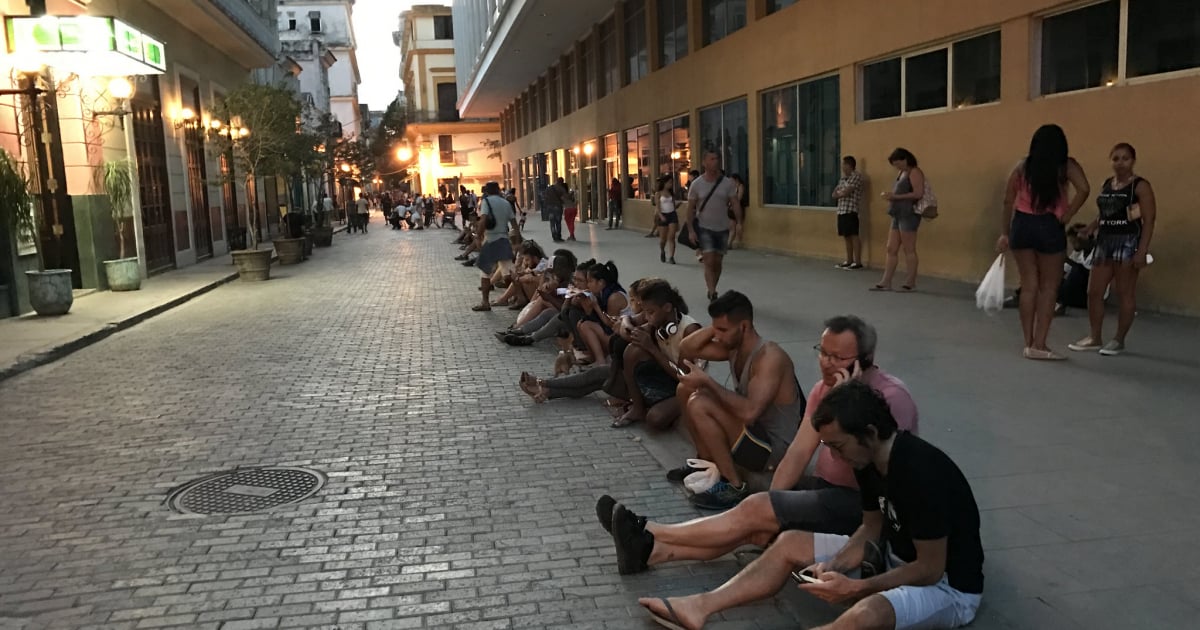
Related videos:
The Cuban government claims to have doubled internet traffic in 2024, but connectivity remains restricted due to censorship, high costs, and poor service quality managed exclusively by the state-owned Telecommunications Company of Cuba S.A. (ETECSA).
According to the official outlet Granma, internet traffic in Cuba saw a significant increase, rising from an average of 113,045 Gigabits per second (GBPS) in download and 16,914 GBPS in upload between January and November 2022, to 239,019 GBPS in download and 40,605 GBPS in upload in July 2024.
The news portal also reported that digital network subscribers in Cuba have reached 6 million, a significant increase from the 4.2 million recorded in 2022, despite the challenges posed by the energy crisis and the frequent internet outages implemented by the regime.
Among the most widely used platforms are Facebook and WhatsApp, each with 6 million users, followed by Telegram with 5.9 million, and Instagram and YouTube, both with 5.8 million users. Meanwhile, X (formerly Twitter) has 4.8 million subscribers.
It was also noted that there are 7.9 million mobile lines in service in the country, of which 7.2 million have internet access, reflecting an increase in mobile connectivity despite the economic challenges facing the population.
According to Granma, 84% of the popular councils in Cuba have mobile phone coverage, of which 50.4% have access to 4G and 87.53% to 3G, thanks to the installation of over 6,000 radio bases across the country.
On the other hand, despite the failure of the so-called banking initiative, the Cuban government boasted that there has been an increase in online transactions and the use of electronic payments through the Transfermóvil and EnZona platforms, largely due to the persistent lack of cash at bank branches and ATMs.
Finally, the official spokesperson Granma concluded its view on the Cuban internet landscape, once again blaming "media aggression" and "digital campaigns" for the country's problems, in a clear attempt to evade government responsibility.
According to the website, these actions aim to "damage the government's image," even in the midst of emergencies like hurricanes and earthquakes, disregarding the fact that discontent arises from the very citizens affected by the crisis and state inefficiency.
Despite the triumphalist rhetoric of the Cuban regime, the most recent report from the non-governmental organization Freedom House, which covered up to May 2024, revealed a very different reality regarding internet freedom on the island.
According to the document, internet freedom in Cuba remained highly restricted during the analyzed period, with authorities intensifying their repressive efforts to censor and punish online dissent.
The quality of internet connections, managed exclusively by ETECSA, remained poor.
Additionally, the high access costs, exacerbated by the severe economic crisis the country is facing, make the internet an inaccessible service for a large part of the population.
This context stands in stark contrast to the government’s claims about progress in connectivity and the use of digital technologies.
The report emphasized that the Cuban regime responded to independent digital innovations with repressive measures such as blocking news sites, threatening digital journalists, and imposing severe penalties for online activities.
An emblematic case is that of Mayelín Rodríguez Prado, who was sentenced to 15 years in prison in April 2024 for posting images on Facebook of a protest that took place in August 2022. This type of sanction reflects a tightening of the criminalization of digital activities in the country, noted Freedom House.
Additionally, selective internet disruptions were documented in connection with public protests. In March 2024, during demonstrations in Santiago de Cuba, at least one connectivity interruption was recorded, a pattern that illustrates how the regime uses control of the digital spectrum as a tool of repression.
Although no intentional nationwide blackouts were reported during this period, independent journalists, activists, and civil society members faced restrictions aimed at limiting their access to the internet.
The regime has also worked to manipulate the online information landscape to its advantage. According to Freedom House, this includes the use of pro-government trolls and defamation campaigns, such as the one targeting the independent media outlet elTOQUE.
Another clear example of censorship in Cuba is the case of CiberCuba, which despite the discrediting campaign carried out by the Cuban regime, has "worked tirelessly for ten years to be the digital voice of Cubans, facing challenges and overcoming obstacles, always with the goal of keeping the audience informed in an objective and truthful manner."
These tactics aim to discredit critical voices and reinforce the official narrative, demonstrating a comprehensive strategy of control that encompasses not just physical means, but also discourse.
On the other hand, Freedom House reported that journalists, activists, and independent media have also faced invasive and disruptive cyberattacks, including account hacks and more sophisticated methods of digital sabotage.
These actions are part of a broader strategy of intimidation and surveillance aimed at silencing those who challenge the official account of events in Cuba.
Filed under: